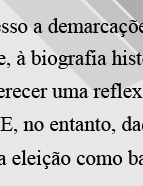

................................
In other more specific areas beyond the broad historical frameworks, the entry of some of these academics into the realm of dissemination essentially involved sharing their own interests and research efforts for the benefit of popular education. The preferred model, given the predominance of thinkers and artists as subjects, was that of life and work. In the fields of literature and the arts in general (particularly plastic arts), this intervention strategy proved fruitful, sometimes at the expense of the old format of publishing in fascicles, aimed at widening access to editions that would otherwise be unaffordable for many. José-Augusto França is perhaps one of the most perfect and persistent examples of this type, having published short biographies in various art collections targeting a non-university audience. In the area of literary history and thought however, although in larger volumes, sometimes containing excerpts of works and targeting necessarily cultivated readers, the involvement of academics in a publishing market beyond the strict academic circle had become quite noticeable since the mid-century. For example, in Arcádia (in "A obra e o homem" ["The Work and the Man"] collection) where, ,until the late 1970s, works by Hernâni Cidade, Óscar Lopes, and Oliveira Marques were published (and re-edited), as well as by Álvaro Dória and António Quadros, and in Inquérito, which published several volumes of Plutarch's Lives between the 1930s and 1940s, and with which Joel Serrão and J.-A. França, among others, also collaborated.
Essentially, the response to the invasion of the historian's own field of research and action involved a reinforcement of scholarly tradition, less permeable to the contamination of ideas and primarily intended for internal consumption. Thus, the disciplinary boundaries of history were delineated. Among academics, biographical production often tended to be, above all, a work tool and a framework for research, whether among historians themselves (such as committed biographers Banha de Andrade, Pina Martins, M. Lopes de Almeida, and Teixeira da Mota), or those who made biography the essential cornerstone of the history of their discipline, from economics (such as Moses Amzalak) to medicine (following in the footsteps of Maximiano Lemos, A. da Rocha Brito, Jaime Walter, and Luís de Pina). Here the most direct heirs of Sousa Viterbo and Braamcamp Freire can be found, but also those who, adopting a methodology geared towards the reconstruction of individual trajectories, turned biography into both an exercise in dissecting singular lives and a gateway to broader historical epochs, entities, and processes. Even here, however, in the more specific field of academic production, there was no absolute immunity to the prevailing ideology, whether due to individual choice or institutional conditioning. The selection of themes and protagonists often reflected this dominant conception of a history grounded in its golden ages and the men who had shaped them.
